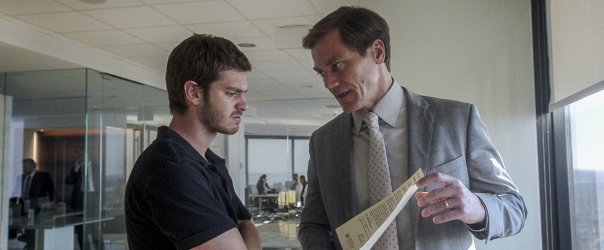
Not long into 99 Homes, director and writer Ramin Bahrani sets a tone and pace for the film that is unsettling, gripping, dark that lasts through the length of the story.
Michael Shannon, as realtor and businessman (on the surface) Rick Carver, and Andrew Garfield as Dennis Nash find themselves connected when Carver evicts Nash from his home.
Carver’s company owns homes on behalf of the bank and he regularly shows up at families’ doors (almost mafia style) to deliver the bad news with a posse of workers and the police force in tow.
Most of the time Carver leaves any contact with families on the street with all their belongings, but not Nash.
Nash is in need of work and starts helping Carver — out of true desperation to support his family — under the guise he will be doing home repairs and construction.
But Carver is far too powerful to have that be it and does make it clear early on that he “owns” those who work for him.
From there, Carver and Nash’s dynamic and relationship fluctuates as a result of Nash’s own struggles contributing to people losing their homes like he did and the ultimate why reason Carver is on a power trip in the realty business. Carver only gives a small glimpse into why he is the way he is and in his line of work, but it is telling.
Shannon’s performance continues to show his range as a dramatic actor, as a lot of his roles present characters with a duality between good and bad, and it is effectively balanced by Garfield’s character in this film also trying to decide between doing what’s right and wrong.
Stylistically, 99 Homes has little camera work and effects that stray away from keeping the lenses focused on the characters that drive the story as it builds to the deciding moment between Nash and Carver.
99 Homes keeps the suspense going until the very end of the film and creates enough unknown in the characters’ motives to conclude in an effective unexpected way.
—
I have a hard time finding quotes that directly relate to the movies I watch, or it’s subjective, but here are some thoughts from Dana Gould from The Dana Gould Podcast Happysad episode. It is in the last 10 minutes or so as part of a conversation with April Richardson.
“To live is to suffer. Suffering is inevitable for all human beings as long as they labor under the delusion that things can be permanent, when in fact nothing is permanent. Your life is composed of a series of systems. Your culture, your relationships, your physical body, they’re all systems. Systems all have one thing in common they all begin, grow, flourish, decay and die. Everything, without exception.”
“Zen is when you abandon the concept of the past and the future and embrace only the moment. If you can free yourself from the events of the past, which is dead, and your expectations of the future, which is fantasy, and embrace only the moment in which you are alive by freeing yourself from the tyranny of all of those wants that you have … you can achieve a state of zen consciousness, which leads to bliss. But of course, by it’s very nature, it won’t last.”